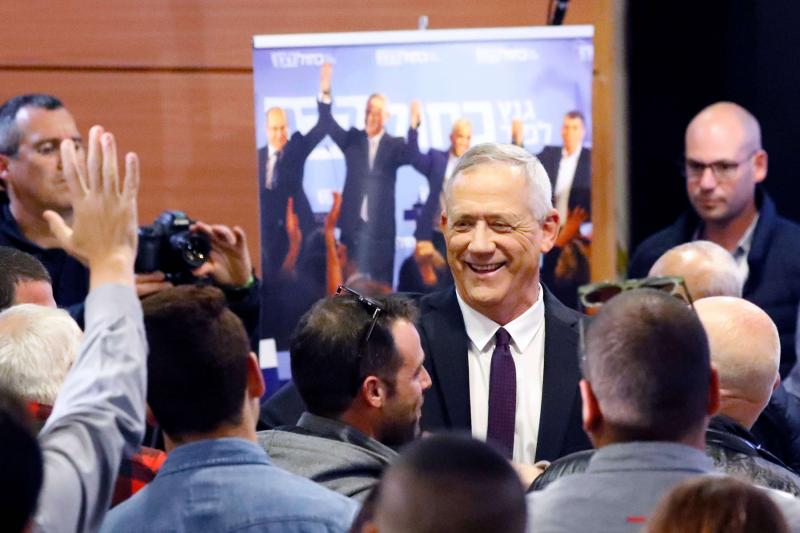Israel’s election campaign went to Washington on March 25, big time.
Both front runners for the April 9 poll — incumbent Prime Minister Binyamin Netanyahu and his challenger Benny Gantz of the Blue and White party — made high-profile appearances in the American capital.
Netanyahu met with his buddy and political benefactor US President Donald Trump at the White House. Gantz showed up at the American Israel Public Affairs Committee (AIPAC) conference, the largest US lobby for Israel. There, Gantz emphasised his military credentials and condemned corruption and racism. At another event, Gantz criticised Netanyahu for the deteriorating security situation in Israel.
Some 6,000 miles away, the action was heating up and Gantz’s words seemed all too true. Israel’s military struck with force after a rocket fired from Gaza hit a family home north of Tel Aviv. The Israeli action was, its acting foreign minister said, the largest operation undertaken in Gaza since 2014.
There was a moment on March 25 when events seemed to be spiralling into war but then Hamas announced a ceasefire, which the other party disdained to acknowledge.
What’s happening with Israel and the United States is clear. In both countries, incumbent leaders see political advantage in helping each other with base appeals to the lowest common denominator. This symbiotic relationship pays little heed to the Arab world, which is, in any case, too discombobulated to worry about Gaza (or the Golan Heights).
Election billboards across Israeli cities show Netanyahu with Trump, with the triumphal proclamation that Israel’s leader is in “another league.” It is a reference to the extent to which Trump’s America continually favours Israel on Netanyahu’s watch. Just days ago, Trump officially (and unilaterally) recognised Israeli sovereignty over the occupied Golan Heights, defying international law on sovereign borders,
As for Trump, he, too, sees political advantage in being the president who moved the US Embassy to Jerusalem, defends Israel at the United Nations and constantly privileges that country over all others in and beyond the Middle East. Trump’s agenda is obvious. He wants to keep his evangelical support and is angling for the American Jewish vote, which has long been solidly Democratic.
Clearly, Trump will run for re-election on a solidly pro-Israel platform. However, the campaign overall is likely to generate some heat — if not much light — on the Palestinian issue. Consider what is happening with some of the large contingent of Democratic candidates vying to become their party’s nominee for president.
As many as 12 of the declared Democratic candidates for president stayed away from the annual AIPAC conference. It may be a nod to progressive advocacy to highlight Israel’s treatment of Palestinians. Only one of the AIPAC stay-aways — US Senator Bernie Sanders of Vermont — explicitly cited concern “about the platform AIPAC is providing for leaders who have expressed bigotry and oppose a two-state solution.”
Another, Senator Kamala Harris of California, seems to hew to a fairly traditional, see-no-evil stance on Israel. Harris, who has generated enthusiasm and, more important, small donations as proof of her appeal as a presidential candidate, skipped AIPAC but allowed its leading officials to visit her office instead and subsequently tweeted plain vanilla support for Israel.
Sanders, a Jewish leftist who lived on an Israeli kibbutz in the 1960s, has previously lumped Netanyahu in a rising global authoritarian axis along with Brazil’s Jair Bolsonaro. In Sanders’ 2016 run at the Democratic Party’s presidential nomination, he shattered the usual American taboos on Israel, calling for “respect and dignity” for the Palestinian people and a warning “that Netanyahu is not right all of the time.”
It is on the outer fringes of US 2020 electoral politics — the hopeful but eventually hopeless Democratic Party candidacies — that the Palestinian issue is pushing up through the weeds of domestic policy debate.
The most recent and telling was what happened to Beto O’Rourke, the 46-year-old Texan who’s considered a Democratic box office star but a long shot for the presidency or even the nomination.
A Palestinian-American woman asked O’Rourke a pointed question at the University of New Hampshire about American support for Israel. In response, he agreed Palestinian conditions don’t meet American values of “fundamental human rights and human dignity,” that the relationship with Israel is hurting America’s image in the world and a two-state solution with “security, safety and dignity” for Israelis and Palestinians was the only solution.
O’Rourke spoke lyrically, inspirationally but, sadly, all too theoretically. He never addressed, as his questioner later lamented, the specific points she raised about the Boycott, Divest and Sanctions movement and US withdrawal of funding to UNRWA, which helps Palestinian refugees. For good measure, O’Rourke took it upon himself to assail the Palestinian Authority.
The angst expressed on social media by O’Rourke’s questioner prompted James Zogby, president of the Arab American Institute and a founding member of the Palestine Human Rights Campaign in the 1970s, to tweet a measured sense of hope. “Since most pols have spent their careers trying to ignore Palestinian rights,” Zogby wrote, using an informal abbreviation for American politicians, “it’s an opportunity to force them to address it. Ask #BetoORourke enough times — he’ll figure it out & might get better.”
That sounds about right. The question needs to come up — a lot — this election season even if no substantive answers are offered.


